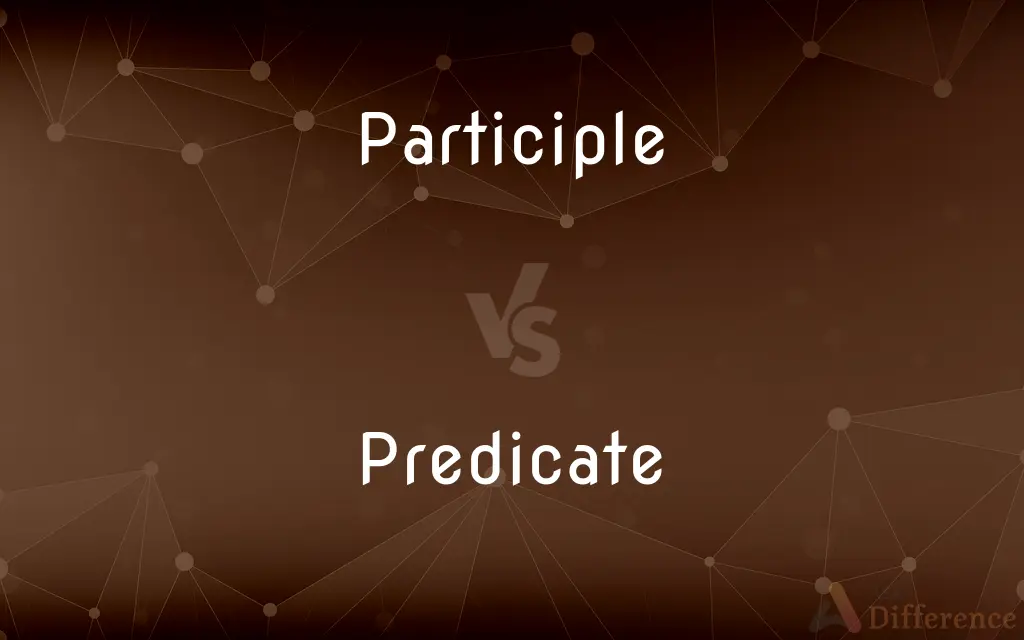Participle vs. Predicate — What's the Difference?

Difference Between Participle and Predicate
ADVERTISEMENT
Compare with Definitions
Participle
In linguistics, a participle (PTCP) is a nonfinite verb form that has some of the characteristics and functions of both verbs and adjectives. More narrowly, participle has been defined as "a word derived from a verb and used as an adjective, as in a laughing face".“Participle” is a traditional grammatical term from Greek and Latin that is widely used for corresponding verb forms in European languages and analagous forms in Sanskrit and Arabic grammar.
Predicate
To base or establish (a statement or action, for example)
I predicated my argument on the facts.
Participle
A form of a verb that in some languages, such as English, can function independently as an adjective, as the past participle baked in We had some baked beans, and is used with an auxiliary verb to indicate tense, aspect, or voice, as the past participle baked in the passive sentence The beans were baked too long.
Predicate
To state or affirm as an attribute or quality of something
The sermon predicated the perfectibility of humankind.
Participle
(grammar) A form of a verb that may function as an adjective or noun. English has two types of participles: the present participle and the past participle. In other languages, there are others, such as future, perfect, and future perfect participles.
ADVERTISEMENT
Predicate
To carry the connotation of; imply.
Participle
A part of speech partaking of the nature of both verb and adjective; a form of a verb, or verbal adjective, modifying a noun, but taking the adjuncts of the verb from which it is derived. In the sentences: a letter is written; being asleep he did not hear; exhausted by toil he will sleep soundly, - written, being, and exhaustedare participles.
By a participle, [I understand] a verb in an adjectival aspect.
Predicate
(Logic) To make (a term or expression) the predicate of a proposition.
Participle
Anything that partakes of the nature of different things.
The participles or confines between plants and living creatures.
Predicate
To proclaim or assert; declare.
Participle
A non-finite form of the verb; in English it is used adjectivally and to form compound tenses
Predicate
To make a statement or assertion.
Predicate
(Grammar) One of the two main constituents of a sentence or clause, modifying the subject and including the verb, objects, or phrases governed by the verb, as opened the door in Jane opened the door or is very sleepy in The child is very sleepy.
Predicate
(Logic) That part of a proposition that is affirmed or denied about the subject. For example, in the proposition We are mortal, mortal is the predicate.
Predicate
(Grammar) Of or belonging to the predicate of a sentence or clause.
Predicate
Stated or asserted; predicated.
Predicate
(grammar) The part of the sentence (or clause) which states a property that a subject has or is characterized by.
Predicate
(logic) A term of a statement, where the statement may be true or false depending on whether the thing referred to by the values of the statement's variables has the property signified by that (predicative) term.
A propositional variable may be treated as a nullary predicate.
A predicate is either valid, satisfiable, or unsatisfiable.
Predicate
(computing) An operator or function that returns either true or false.
Predicate
(grammar) Of or related to the predicate of a sentence or clause.
Predicate
Predicated, stated.
Predicate
(law) Relating to or being any of a series of criminal acts upon which prosecution for racketeering may be predicated.
Predicate
(transitive) To announce, assert, or proclaim publicly.
Predicate
(transitive) To assume or suppose; to infer.
Predicate
To base (on); to assert on the grounds of.
Predicate
To make a term (or expression) the predicate of a statement.
Predicate
To assert or state as an attribute or quality of something.
Predicate
To assert to belong to something; to affirm (one thing of another); as, to predicate whiteness of snow.
Predicate
To found; to base.
Predicate
To affirm something of another thing; to make an affirmation.
Predicate
That which is affirmed or denied of the subject. In these propositions, "Paper is white," "Ink is not white," whiteness is the predicate affirmed of paper and denied of ink.
Predicate
The word or words in a proposition which express what is affirmed of the subject.
Predicate
Predicated.
Predicate
(logic) what is predicated of the subject of a proposition; the second term in a proposition is predicated of the first term by means of the copula;
`Socrates is a man' predicates manhood of Socrates
Predicate
One of the two main constituents of a sentence; the predicate contains the verb and its complements
Predicate
Make the (grammatical) predicate in a proposition;
The predicate `dog' is predicated of the subject `Fido' in the sentence `Fido is a dog'
Predicate
Affirm or declare as an attribute or quality of;
The speech predicated the fitness of the candidate to be President
Predicate
Involve as a necessary condition of consequence; as in logic;
Solving the problem is predicated on understanding it well
Share Your Discovery

Previous Comparison
Gentlelady vs. Gentlewoman
Next Comparison
Aglow vs. Glow













































